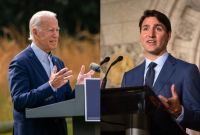“In wartime the provinces were forced to concede their jurisdiction over provincial resources to the central government. Canada passed in the twinkling of a pen from a free enterprise system regulated by ten jealously competing sovereignties to a centrally directed economy regulated by the government’s perception of the needs of the war.”
— historians Robert Bothwell and William Kilbourn, in their biography of Second World War Minister of Munitions and Supply C.D. Howe
After a year in which the pandemic stalled progress on climate mobilization, momentum seems once again to be picking up. The Supreme Court has said the federal government can and should lead. National governments, including Canada’s, are ramping up their greenhouse gas reduction targets. It feels like climate might again surface as a central issue in the next federal election.
Yet a harrowing gap remains between what science says is required and the policy and budgetary commitments we’ve seen so far.
Some say we should make allowances for the special challenges faced by the Trudeau government. “Canada is a country that produces and exports its energy, and so I understand that this will not be easy,” our prime minister said in his speech to last week’s Leaders Summit on Climate convened by U.S. President Joe Biden. True, Justin Trudeau needs to navigate the challenges of Canadian confederation and the reality that some provinces are currently heavily reliant on the extraction of fossil fuels.
If Canada were a unitary state, and not one of the world’s leading fossil fuel producers, acting in the face of the climate emergency might be easier. But we aren’t. Some feel sympathy for Prime Minister Trudeau, forced to contend as he must with premiers like Jason Kenney, Scott Moe, Brian Pallister and Doug Ford, all keen to stymie his best climate efforts.
But consider this: The last time we faced an existential threat — in the Second World War — the prime minister of the day had it pretty rough, too. The wartime government of William Lyon Mackenzie King also faced a squad of provincial premiers that included some notoriously strong and prickly political personalities — William “Bible Bill” Aberhart in Alberta, Mitch Hepburn in Ontario, and Thomas “Duff” Pattullo in B.C. None of these men were keen to relinquish power to Ottawa, all had major disagreements with the prime minister, and the first two strongly disliked or distrusted King. If and when Trudeau and Mackenzie King meet in the hereafter and argue about which of them had to contend with the more troublesome band of premiers, it is not clear to me who would rightly win the debate.
And yet, do you know what all those premiers did in the Second World War? They forfeited all authority over personal and corporate taxation to the federal government for the duration of the war, in exchange for a federal transfer, so that Canada’s dollars could be mobilized for a total war effort to maximum effect. Imagine that, eh?
In the face of a clear threat and generational mission, the provinces accepted that the federal government should be empowered to do what was necessary. Remarkable what becomes politically possible, with the right kind of leadership, when our governments recognize that an emergency exists and that co-operation is needed to ensure an all-embracing national effort.
And makes for quite the contrast with the temper tantrums so many of today’s conservative premiers have pitched over carbon pricing.
The Supreme Court of Canada, in its March decision on the federal carbon price, seems to have recognized a moment of similar imperative, with implications well beyond the modest tool of carbon pricing. As the majority decision of the court stated, the climate crisis represents a “threat of the highest order to the country, and indeed the world… The undisputed existence of a threat to the future of humanity cannot be ignored.” The David Suzuki Foundation (along with the legal team at Ecojustice) had intervened in the case, specifically to argue that climate change constitutes a national “emergency,” something with which the justices seemed to have concurred (even if the feds themselves had failed to make this argument).
The chief justice wrote: “It is necessary to consider the interests that would be harmed — owing to irreversible consequences for the environment, for human health and safety and for the economy — if Parliament were unable to constitutionally address the matter at a national level… This irreversible harm would be felt across the country and would be borne disproportionately by vulnerable communities and regions, with profound effects on Indigenous Peoples, on the Canadian Arctic and on Canada’s coastal regions. In my view, the impact on those interests justifies the limited constitutional impact on provincial jurisdiction.”
So, the federal government has the legal right to act in the national interest and the moral duty to forcefully do so. The mobilization we now need cannot be prevented by the foot-dragging of some provincial governments.
True, the climate mobilization cannot succeed if undertaken by the federal government alone. It needs to be a society-wide endeavour, and all levels of government have an important role to play — the federal government, each province and territory, each Indigenous nation and each municipal government. And fossil fuel-reliant regions need to be fairly accommodated as we ramp up an ambitious climate plan (as I outlined in a previous column). But the feds can and should lead.
There is also a compelling economic argument for federal leadership. As this pandemic year has highlighted, it is the feds who, with the Crown-owned Bank of Canada at their disposal, have the fiscal capacity to spend what is needed to confront this crisis.
Sadly, however, this federal government has so far shown no sign of truly understanding the climate emergency. As last week’s budget made clear, the money is simply not yet forthcoming to realize our critical climate goals.
The government’s tendency to announce and then reannounce big spending commitments, and to spread that spending out over many years, can make it hard to isolate exactly what is being promised. Helpfully, Canadian Centre for Policy Alternatives researchers Hadrian Mertins-Kirkwood and Clay Duncalfe have done the task for us. After a careful review of all the federal government’s climate spending commitments last year and this year, they conclude the government is proposing to allocate “just $31 billion (over six years) — approximately $5.1 billion per year — to the cause. That’s the equivalent of 0.25 per cent of Canada’s GDP.”
Meaning nowhere near what it should be. As I explained in my last column, the Biden administration is proposing to spend much more as a share of the U.S. economy. If Canada were to take the advice of leading climate economist Nicholas Stern, we would be spending two per cent of GDP on climate action, or about $40 billion a year.
As former clerk of the Privy Council Alex Himelfarb wrote about last week’s federal budget, it was not “transformative,” a tremendous lost opportunity given the confluence of the pandemic, inequality and climate crises. “We talk emergency” on the climate crisis, writes Himelfarb, “but our actions don’t match.”
The federal government’s approach to the climate crisis, in the main, remains focused on incentivizing — with tax cuts, carbon pricing, rebates and cajoling — households and businesses to take climate action. This strategy is destined to fail. If we continue with this approach, Canada will once again miss its greenhouse gas reduction targets.
If our urgent targets are to be met, the government must either take charge of the task itself — spending what it takes to succeed and creating new public institutions to get the job done — or it must mandate that certain action be taken, by both industry and households. That is the only path to victory.






Comments
The government is taking its real cues from the people it serves, like any good democracy.
The people may say words like 'crisis' and 'emergency' when polled, but they don't act like its a crisis. Greta Thunberg showed the way: stop taking airplanes. Nobody else did.
The people, bless their hearts, reacted to the lowering of fossil-fuel prices by switching up from cars to SUVs and Trucks, which I notice are still the dominant television ad. They switched up from 1200 sf houses to 1600 sf and now 2000 sf. Heat pump sales for those giant houses are almost unheard of, though a heat pump costs a lot less than that extra 400 sf.
Government will treat it as an emergency when the people do. Right now, any government taxing or regulating away those SUVs and transcontinental vacations would be on the political scrap heap in weeks.
No argument that the general public is disinformed, distracted, scientifically illiterate, disconnected from nature, apathetic, complacent — and incapable of responding to emergency. Decades of climate change denial campaigns funded by the fossil fuel industry do not help.
Come election time, millions of low-information voters stream to the polls. Millions more citizens (30-40% of the electorate) stay home. Such is the state of our "democracy".
I do not trust the "Lock 'er up" crowd to govern themselves wisely, much less the rest of us.
Can a million people be wrong? You bet.
The present COVID crisis is a case in point. The public is unable to govern itself.
Democracy depends upon a well-informed citizenry. Even so, the public has not the expertise, knowledge, temperament, or time to inform and govern itself on complex issues.
How would people on the street negotiate complex trade deals, int'l conflict, minority rights, and other matters that require in-depth knowledge, awareness of history, financial acumen, and expertise?
The political dynamic Mr. Brander describes sounds like government by poll or referendum. Government by poll makes for bad policy, especially when it ignores science.
There are good reasons we do not have govt by poll. That's called mob rule. Govt by poll opens the door to demagogues. Poll results confirm the power of propaganda and deception on low-information voters.
Where would a referendum on taking action to stop the spread of COVID-19 leave us?
Individuals pursuing their own private interest frequently overlook the common good. Individuals will vote for their selfish, short-term interests, not the public interest.
A key provision of constitutional govt is protection of minority rights. Mob rule tramples minority rights. Two wolves and a sheep try to decide what to have for dinner.
Is ill-informed and misguided opinion just as valid as informed opinion based on facts, evidence, and context? If people do not have the information they need, how can they make rational choices?
If we had govt by poll, there would be no need for politicians to inform themselves, consult experts, consider wider context, provide leadership, temper public emotion and impulsivity with foresight, and deliberate with wisdom.
Who speaks for future generations and other species? Future generations have an interest in environmental protection. Unfortunately, they do not vote. Who speaks for wildlife?
Politicians should resist the temptation to govern by poll. Or, as Mr. Brander puts it, take their cue from the people. Policy should be based on the best available science and evidence.
The word "govern" derives from a Greek word meaning to steer or pilot a ship. In this case, the ship of state. A ship run by its fickle passengers, who seldom agree amongst themselves, drifts aimlessly or runs aground.
A key role and responsibility of government is to educate, inform, and lead. Ideally, politicians will take the long view of the big picture. Set emotion aside and act dispassionately. Inform themselves on and debate issues before passing laws. Consult the experts.
If politicians cannot provide leadership on the issue of our time, they have no business running for public office. If politicians merely do what the (majority of) people want, what are they but mere placeholders?
Fossil-fuel addiction goes far beyond the individual. Society is structurally dependent on fossil fuels. No cure for individuals is possible until society is transformed. A focus on individual behavior distracts from the systemic changes the problem requires.
As a society, we need to change the menu of energy options and price them properly so that consumers can make rational, more sustainable choices.
Systemic problems require systemic solutions.
Individual lifestyle changes matter, but they are not the whole ball game.
Hard to take a bus if it isn't there.
This is where government comes in.
Changing our transportation systems, urban design, and power grids are large-scale enterprises, requiring community resources and commitment:
- Building cities for people, not cars. Making neighbourhoods walkable.
- Investing in public transit and cycling infrastructure.
- Access to amenities: schools, shopping, grocery stores, parks, recreation.
- Affordable housing based on net-zero designs and district-energy systems.
- Utility-scale renewables require utility-scale uptake, and inter-regional tie-in.
Climate change represents the greatest market failure in history.
Who can correct that market failure if not government? Hence, carbon pricing. Not a problem individual citizens can remedy.
Subsidies and externalized health and environmental costs have created an uneven playing field. Only govts and economy-wide carbon pricing can solve the problem.
People travel in cars for lack of public transit, but they didn't switch up to SUVs for that reason. They switched up because they didn't think the SUV was all that great a sin.
And no propaganda was involved in selling air travel, none. Nobody was forced to stop taking Greyhound so that it went broke in the West and cut service; people just took air by preference when it got cheaper.
I'm with George Monbiot's position in his book, "Heat": I think the only actions that will work are actions that allow people to continue with some semblance of the modern lifestyle.
RB wrote: "People travel in cars for lack of public transit"
People travel in cars for all sorts of reasons. Many people would not take transit even if it were efficient, faster, and free.
Public transit suffers an image problem in North America, at least. Dirty, unsafe, crowded, and in the age of COVID, possibly even unhealthy. You are at the mercy of your fellow travellers. You share their airspace and their viruses. Increasingly costly. Sprawl driven by cars makes efficient transit impossible.
Walking through the snow and waiting for a bus on a winter's day is daunting, especially if the bus is late. If you drive, you decide your departure time. No wait necessary. No missed cars, unless it's stolen.
Many drivers have a personal attachment to their own car. Which is why car-sharing will not replace the private automobile any time soon. People will not give up their cars of their own free will. Even if car-sharing is more economical.
To the affluent, cost is no object. Cars are a status symbol. A reflection of one's income and worth. An extension of self. A personal statement.
If a man's home is his castle, his car is his second home. People decorate and personalize their cars, inside and out. The car is their personal living space.
The iconography of the car and its association with freedom, independence, sexuality (hard to make out on a bus), and masculinity is undeniable. This largely a product of advertising.
Cars offer many practical advantages. People frequently store and carry personal items in their car: CDs, clothes; items for specific tasks, e.g., tools and equipment required for work. (Think of all the stuff a real estate agent has to lug around.) Also sports gear (e.g., golf clubs), baby strollers; items to accommodate special needs, e.g., car seats for infants. Items for a picnic or a day trip to the lake. On your way home from work, you can stop at the store for a quart of milk.
The above written by a non-driver. In my small town, I walk everywhere I go. I have gone for years at a time without even getting into a vehicle. To me, cars, sprawl, and car culture are the scourge of urban life; the cause of countless deaths and injuries; a peril to insects, birds, and wildlife; and a plague upon the earth.
------------------------------------
RB wrote: "people just took air by preference when it got cheaper"
You put your finger on the problem — and its solution.
Fossil fuel producers and consumers use the atmosphere as a free dump. As long as it is cheaper to pollute, that's what industry and consumers will do. As long as private benefit is cheaper than the public good, the public good will suffer. As long as personal convenience is cheaper than sustainable alternatives, people will satisfy their own desires, regardless of the cost to society. As long as it's cheaper to pollute than to protect our planet, that's what we'll do.
The speed at which we shift away from fossil fuels and take other essential steps towards sustainability largely depends on economic signals. An economic system that permits/ignores/rewards damage to our biosphere is doomed to fail.
In a functional market, all costs are internalized -- priced into the product. Absent realistic price signals to guide consumers to make rational decisions, environmental mayhem is inevitable.
Free-market advocates should support full-cost accounting (including carbon pricing), which internalizes externalized health, environmental, and climate costs.
If we do not pay our energy and environmental costs in full, someone else pays our tab. Industry and consumers download their individual costs to the public purse, future generations, and the environment. A recipe for disaster.
The most efficient way to prevent and solve environmental problems? Correct the market failure.
The costs of degrading our life-support systems indefinitely are prohibitive. The solution? Price unsustainable goods, services, design (e.g., sprawl), and paradigms out of existence. I.e., price them properly. As long as we externalize environmental and health costs, we subsidize our own destruction.
This is where government comes in. Individuals cannot solve market failure. Only government can.